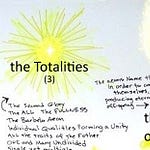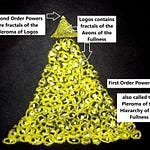Hello and welcome back to Gnostic Insights. The Halloween season is upon us. I'm having a Halloween party, a block party, here in the neighborhood, and I'm going to sing an hour's worth of spooky songs. And I was assailed yesterday by a Christian lady who said I'm doing the work of the devil, because these are not good songs. And she also urged me not to share this Gnostic business with someone in particular, because he doesn't need that sort of confusion, she said. Of course, she doesn't know what the Gnostic stuff is. She hasn't listened to the podcast or even talked with me about it. She just puts up her hand and waves me away if I try to bring up the Gnosis. So I would say that if Halloween glorifies Satan in your mind, then you should not partake in it, because we don't want to glorify evil or glorify the Slanderer.
However, there was a verse in Colossians that addressed this subject, in my opinion. In Colossians 2:15 it says,
Stripping the Archons and Powers, he exposed them in the open, leading them prisoner along with him in a triumphal procession. Therefore let no one judge you for eating and drinking, or for taking part in a festival, or in a new moon celebration, or in Sabbaths. These are a shadow of things to come, but the solid body thereof is that of the anointed. Let no verdict be passed against you by anyone affecting humility and a religion of the angels, venturing upon visions he has never had, blustering aimlessly by the mind of his flesh, not holding to the head from whom all the body, furnished and knitted together by its joints and ligatures, will grow with a growth from God.
We spoke about freedom from the Law in depth a couple of episodes ago, when we talked about Colossians. Of course, this presupposes that we who are freed from these laws and restrictions have the love of God, the love of Christ, dwelling within us. That's what has replaced and made null those sanctions against things like Halloween. We can't do it on our own. This verse in particular in Colossians refers to eating and drinking, festivals, new moon celebrations, and Sabbaths. It seems to me that we may infer that some of these festivals were not sanctioned by the Old Testament. It may also be that, if they were official calendar days in Judaism, that early Christians were divided about whether they should apply to the followers of Jesus, as in the example of modern Seventh Day Adventists who strictly keep the Saturday sabbath and believe all other Christians are in mortal error for switching the sabbath to Sunday. Or the festivals may be syncretistic, meaning they combined pagan and religious elements to form a new celebration, as is the case with Christmas. Or the festivals could have been entirely pagan, such as May Day celebrations to usher in springtime.
The quote says that all of these activities referred to in this verse are only “a shadow of things to come.” Surely Halloween is not to be found in the ethereal plane, because the spooks, goblins, and witches are “shadows” of the Fall, and we know that shadows is another word for archonic. They did not exist before the Fall and will not exist after the cosmos passes into nothingness. Indeed, Halloween can be seen as an example of we Second Order Powers “stripping the Archons and Powers… leading them prisoner along with [Christ] in a triumphal procession.” Wouldn’t that be a fun activity at a Halloween Party? A parade of conquered Powers?
Halloween is a time when people acknowledge that the world is not always as it seems. It is a time when folks who normally dismiss the ethereal and the archonic realms acknowledge the immaterial Powers and bring them to awareness. Our gnostic studies, so often dismissed and ridiculed by most people, fall into this category.
Consciousness is one thing—even scientists study consciousness, but they do not understand the root of consciousness, and that comes from above. We are from the Father's consciousness. We are fractals of the Father, through the Fullness, through the Son. The Son is the only emanation from the Father who is otherwise untouchable and illimitable and incomprehensible. But the Son gives that incomprehensibility a face. It's called a countenance. And we can begin to understand the Father by knowing the Son. And the Son and the Father want to be known by us. They are extending consciousness all the way out to us, down through several fractal levels. But we are their consciousness, and we carry the entire seed of the consciousness of the Son within us. All living creatures do.
That is the difference between life and inert mineral matter. The cosmos, when referred to in the Gnostic sense, and also in the biblical sense, although it hasn't been explained correctly in the New Testament, since they stripped out the gnosis that explained the difference between the Father and the Creator God of this universe, which are two different entities. But consciousness is mysterious in that it's an amazing thing that we are alive, that we are conscious, that we have these experiences and memories, and that we're all interrelated.
It's mysterious. It's mystifying. The scientists aren't going to get to the root of it, because they try to find consciousness in the material world. They try to find consciousness arising from the matter up. And that isn't where it comes from. It comes from the Father down. That's the main thing we need to realize, the main thing we need to know.
And then now we have this overlay of the Son, the Christ, Jesus. And what do they have to do with any of this? See, many people think it's all well and good to speak of the Father, and to try to do good, and try to be righteous, and try to embody the love of God. But it's always within our own egoic efforts that we want to push out this love. And we don't have it. We don't have the capacity to channel the love of the Father unless we love the Father, because love, life, consciousness, they all come down together from above.
It's no more superstitious to believe in Jesus than it is to believe in God. It's no more superstitious to believe in Jesus than it is to believe in beneficial spirits and angels. So why then is there such a node of resistance against the notion of the Christ, the embodiment of the Son, coming in a human being that was called Jesus? This occurred around 2,000 years ago. The embodiment of the Fullness of God melded with the material flesh of a human being. That's no stranger than consciousness itself. That's no more strange than the mystery of life and death. So why is it in particular rejected?
Well, I think it's because the Slanderer knows what's up. The Slanderer is another word for the chief Archon of the demiurge. The Slanderer is the negative entity that dwells within the cosmos itself, that did not come from above, that did not come from the Father, that is not an emanation out of the consciousness and love of the Son—it's cut off down here below. It’s a figment of the demiurge. It lives in this material world, and, like its Boss, the demiurge, it wants to be the ruler. It wants to be the king. It wants to be worshipped. It's called the Slanderer because it slanders God. It slanders Jesus and the Christ. It slanders anyone who believes in Jesus and the Christ. It makes fun of them. It puts on pantomimes at the Olympics to degrade the Last Supper, for example. It slanders people's genders and convinces them that they were born into the wrong body, and that that's not who they're really supposed to be. Even though every one of us was fashioned by the Aeons above to be perfect and particular, and to bring with us as emissaries of the Father consciousness, love, and life into this cosmos.
It's our job as second-order powers to bring life into the cosmos. But the cosmos is the valley of death, so it's a very courageous thing that we are here. Now, I have walked with Jesus for all of my life. I can remember my awakening around three or four years old. I recognized the difference between the baby in the manger and Santa Claus when I was about three years old at Christmastime. My parents were not religious people. They might have thought they were; they're what we call cultural Christians, so they did go to church now and then. And there was a family Bible in the house, but God was not spoken of. We were not encouraged to be godly. And it seemed to me, even as a toddler, that Santa Claus was given every preeminence and reality, as was the baby Jesus in the manger who came to save humanity. So, there were mixed messages coming down that pipeline.
I guess what I'm trying to say here is if you want to understand consciousness, and if you want to embody love, the surefire way to do that is to go ahead and believe that the Christ came to earth in order to remind us of the truth of the Father, in order to remind us of the eternal age that we came from, because we came from the Aeons above. And the word Age is the same as the word Aeon in Greek. So, the life of the Age, as it is often put in the New Testament, is the life of the Aeons, the Fullness, our aeonic parentage that we are formed after, and that we were birthed by down here into this material world. And Jesus went through the same process, but the aeonic inheritance that Jesus brought with him—unlike us, we brought all of the Fullness with us too, but just parts of it are turned on and off. I am not talented in all things, but Jesus was, because he brought all of the Fullness and all of it activated, all of it turned on. So, he brought the Fullness of God in all awareness and complete love into this material cosmos, and he has an excess of salvation, you might say, an excess of freeing us from the murmurings of the Slanderer. He brought that to every single one of us, because the Third Order Powers, which is the pleroma of Christ, the pleroma of Jesus, covers us and is our correction for our misunderstandings and our straying away from the Fullness of God. But we forgot. We don't realize it. We don't remember where we come from. And the surefire way to remember where you come from, to remember the Fullness of God, to experience the complete love of the Father through the Son and the Fullness of God, is to accept the gift of incarnation that Christ brought to us. It was a mission, a rescue mission for us.
Jumping over here into what is called the first letter of John in the New Testament, chapter 2, verse 14, it says,
The Logos of God, (the Logos, that's the Aeon Logos we know), the Logos of God abides in you, and you have vanquished the wicked one. Do not love the cosmos or the things within the cosmos. If anyone loves the cosmos, (and that, when he speaks of the cosmos, that's the material world, that's our universe, whatever came after the Big Bang, the molecules, the particles, the minerals, everything that is not inherently alive, the hard rocky places, that's the cosmos.) Do not love the cosmos or the things within the cosmos. If anyone loves the cosmos, the love of the Father is not within him, because all that is in the lust of the flesh, the lust of the eyes, and the vainglory of living is not from the Father, but from the cosmos. And the cosmos is passing away as well as its desire, but whoever does the Father's Will will abide unto the age of the Aeons.
Now, when John refers to hating the cosmos, he is only referring to the dead, dry demiurgic mud and demiurgic culture’s inverted values. He is not referring to the living elements that come from above—all of us Second Order Powers who bring the life, consciousness, and love into this cosmos. It is good and natural to love our fellow Second Order Powers—all of the plants, animals and people and the living cells that make them up.
Jumping to verse 20,
And you have an unction from the Holy One, and you all have knowledge.
Now the translator, which is David Bentley Hart here, concerning the word unction explains in a footnote. The word is chrisma, and he says it's probably anointing, but perhaps an oil, unguent, or a balm. So he just wrote the word unction because it covers all of those words.
You have a unction, (so that's a soothing, a soothing application, let's say, from the Holy One), and you all have knowledge.
And this is that knowledge I'm saying that we're all born with, that's the knowledge of the Fullness of God. It's the inherent knowledge of the Son of God, because our life and our consciousness is the proof of that, because it comes from above, life, consciousness. So therefore, we all have the knowledge of the Fullness within us, but we forget because of the never-ending war with the material, and with the Slanderer, and with death and destruction, and with each other. All of this war, all of this striving and egoic posturing puts a barrier between us and love. Love doesn't arise out of ego. Narcissism arises out of ego. Self-love projected onto another person, and lapped up from another person to build our ego. But that isn't true love. True love comes from above. That is the love of the Father, the love of the Son, the love of the Aeons, and the love that comes along with us when we're first conceived and born. And that's what we tend to forget because of the never-ending war.
So the writer of this first letter of John, who is apparently John, says,
I have written to you not because you do not know the truth, because you do know it.
And you see, that's a very Gnostic opinion. We all know the truth deep inside, but we have forgotten it. But we can remember it. It's just the flipping of a switch, and it will all come flooding back in. He says,
I have written to you not because you do not know the truth, because you do know it. And no lie comes from the truth. Who is the liar except the one that denies that Jesus is the Anointed? This is the Antichrist, one who denies the Father and the Son. No one who denies the Son has the Father. The one who confesses the Son has the Father also. And this is the promise that he has promised us, the life of the Age (or the life of the Aeons).
And he says,
And as for you, the unction that you had received from him remains within you, and you have no need for anyone to teach you. Rather, as his unction teaches you about all things and is true and is no lie, you must abide in him just as it has taught you.
In other words, just as it has taught you the knowledge that abides in you, the knowledge that we were born with. And that is the gnostic message, that is the full knowledge of God, the full revelation of the Father and of the mystery. You know, as I say again, consciousness and life itself is a mystery. So to want to wonder about God or what is the truth of God, that's not silly. It's no more mysterious than wondering about consciousness or being alive or what keeps your heart beating when you're asleep.
It's all wrapped up in this singular package. We are fractals of the Father. We are fractals of his emissary, the Son, who became flesh and dwelt among us, not simply to teach the few thousand people who actually heard him at the time 2,000 years ago, but to serve for us as an example of a human being who knew the Father intimately and walked among us and never wavered in his knowledge and belief in the Father, never once succumbed to the lies of the Slanderer and the lusts of the flesh, and then who was put to death as an innocent man, having done no wrong. He didn't murder anyone or steal from anyone. His crime was to profess knowledge of the Father. And this was the death sentence. And then he was buried for three days, and then he arose again in a non-material form. But he was seen by many, many people afterwards, and then he ascended in full view of hundreds or thousands of people. So this was the job of the Christ, to do all of that. And that's what you believe in when you believe in Jesus, that such a thing is even possible, that there is a Father above. And this man said so, and look, he was innocently sacrificed. He was buried and rose again.
That's no more fairytale than us being alive. It's no more fairytale than anything else. And by the way, many people who say this whole story about Jesus is just a fairytale, they believe in a lot of silly things themselves, I must say. They believe in fairytales. It’s somehow acceptable to believe in astrology, alchemy, ghosts, spirits, luck, destiny, transpersonal consciousness, ETs and AI. But not the redeeming Power of the Anointed.
Chapter three of the first letter of John says,
See what kind of love the Father has given us, so that we might be called the children of God. And we are. Therefore the cosmos does not know us, because it did not know him. Do not be amazed, brothers, if the cosmos hates you. We know that we have passed over from death into life, because we love our brothers. And whoever does not love abides in death. Everyone who hates his brother is a murderer, and you know that no murderer has the life of the Aeons abiding in him. In this we have known what love is, that one laid down his soul on our behalf, and we ought to lay down our soul on behalf of our brothers. But should anyone have the means of living in this cosmos and see his brother in need, and inwardly close himself off from him, in what way does God's love abide in him? Little children, let our love be not in talk or on the tongue, but in action and in truth. By this we shall know that we belong to the truth, and assure our heart before him, that if our heart should offer condemnation, God is greater than our heart, and knows all things.
Now, as a matter of gnostic theology, John seems to have been a bit hyperbolic in declaring that a hateful person does not have the love of God living in him. Hate is the inversion of love. Hate is the demiurgic shadow of love. Yes, the hateful person does not display or even acknowledge the Holy Spirit that animates his life, but he is surely animated by the Fullness of God or else he would not be conscious or alive. The spiritual problem the hateful person has is being cut off from his higher Self, in the same manner that the demiurge is cut off from his higher Self—Logos—and the Fullness above. This leaves them unaware of God’s love and the Anointed’s mission of redemption, but it does not nullify the unseen presence of God and the Anointed in their souls.
See, you may be angry at other people. You may think that half of the people in the nation are wrong and deluded and evil, and you just hate them by now. But God is greater than our heart, and that's the reason we have to have a larger perspective. God loves all of the people on both sides of the political divides and the religious divides. God loves everybody. We are all fractals of the love of God, and the love of God abides in all of us if we will just open the door and let it out. It says in verse 21,
Beloved ones, if our heart offers no condemnation, we have confidence toward God, because we receive from him whatever we might ask, because we keep his commandments and do the things that are pleasing in his sight. And this is his commandment, that we should have faith in the name of his Son, Jesus the Anointed, and should love one another, just as he gave us a command to do. And whoever keeps his commandments abides in him, and he in that one. And by this we know that he abides in us from the Holy Spirit that he has given us.
So when we're speaking of commandments here, it's not the rules and regulations. It's not all the laws of the Old Testament. Those are demiurgic laws. They do reflect what God would wish for us. Indeed, it's true. But you won't go to hell if you don't do it. The more important thing is to believe in the Father and believe in the Son. And you can do this best by believing in Christ and the emissary Jesus who came to us to remind us of that.
Closing out the first letter of John here, chapter 5, it says, verse 18,
We know that no one who has been born out of God sins. Rather, whoever is born out of God keeps watch over himself, and the wicked one does not touch him. We know that we are of God, and that the whole cosmos rests entirely upon the wicked one. And we know that the Son of God has come and given us understanding, so that we may know the one who is true. And we are in him who is true, in his Son Jesus the Anointed. This is the one true God and the life in the Age, (or the life of the Aeons). It closes by saying, Little children, guard yourselves against the idols.
And that's the end of the book. And okay, I'm bringing all this up because it is Halloween. So, know whom you love, put on the armor of God, and then you can walk through the cosmos untouched by the spooky things. If you're going to believe in spooky things, it doesn't make sense not to in the Son of God.
Onward and upward. God bless us all.














Share this post